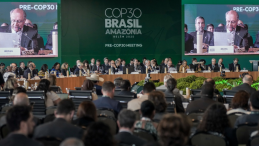The global climate finance system is under strain. Rising debt, inflation, and geopolitical uncertainty are reshaping how countries access capital for energy transition and resilience. Traditional approaches that emphasize the volume of finance rather than its impact are no longer fit for purpose.
This new UNU-CPR discussion paper calls for a “full-spectrum” approach to climate finance – one that aligns fiscal, monetary and regulatory tools within nationally-led systems. As the Circle of Finance Ministers advances the Baku–Belém Roadmap, which supports the new collective quantified goal (NCQG) of mobilizing US$1.3 trillion annually by 2035, the paper outlines practical strategies to turn ambition into action.
Drawing on emerging policy solutions and prototypes, the paper sets out five priorities to operationalize the Roadmap:
- Reform Multilateral Development Banks beyond capital expansion, embedding risk-sharing and domestic system alignment.
- Use concessional finance catalytically, linking it to broader macroeconomic reform.
- Design country platforms that create blended “capital stacks” combining public and private investment.
- Strengthen fiscal capacity to support instruments like green bonds and climate-linked loans.
- Upgrade regulatory frameworks to lower risk premiums and attract long-term investors.
By integrating these tools, countries can translate climate finance into real-economy outcomes—jobs, trade, and price stability—while making climate investments cheaper and more resilient.
Access ‘A Full-Spectrum Approach to Climate Finance’ here.


